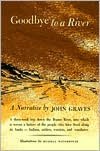Illus. credit: barnesandnoble.com
The electrical repairs have been done to satisfaction. I was anxious to see them done after having to wait a week for materials to be shipped here. There’s nothing available locally except the most rudimentary supplies, and everything else must come by FedEx or UPS truck, which we see in town every day. Sometimes you can drive the 200-miles round-trip to “The City”, but in this case, when the parts became as much electronic as electrical, what I needed wasn’t even available there. With the repairs done and the river beckoning, the winds piped up to twenty-five to forty miles per hour with higher gusts for the last two weeks. There’s nothing that can be done about it. This is just yet another example of how life gets in the way of living. If life and reality and encroaching ice don’t have a strangle-hold around your throat, get out there and share some time with nature. If, however, you’re bound to your armchair, here’s a good tale to preserve your sanity and bide you over.
John Graves grew up along the upper-middle Brazos River of Northeast Texas. He returned after thirty years absence to paddle the river he knew before it disappeared beneath a series of dammed lakes. He launched his canoe just below Possum Kingdom Lake Dam, west of Palo Pinto, and started downstream. Making the trip with him was a six-month old, 12-pound dachshund pup. Graves admitted he wasn’t much of a dog for such a trip, but companionship was companionship. Throughout the book, the pup is known only as “passenger.”
As the river snakes around bends, past creeks, under bridges, by gravel bars, and past small towns, the author recounts the history and folklore that occurred there, from The People, as the Comanches called themselves, starving settlers, get-rich-quick tycoons, or as Graves put it, “cattle kings and horse thieves and half-breeds and whole sons of bitches and preachers in droves and sinners in swarms.” From the ol’ timers he knew as a kid and those he met in his travels, he uses the river and canoe as vehicles to carry you through the Wild West as it really was, not as it became in movies and dime novels.
For the paddler and camper, he shares his campfire with accounts of battling the winds, fishing the gravel bars, encountering people who wander into his camp or he meets while exploring about, and watching the geese, ducks, and deer that entertain him and passenger along the way. For example, he tells of the man who decided to noodle for a huge catfish that he knew lived in a cave under the river’s bank. Knowing the fish was too big to take by hand, he had a harpoon fashioned, and went noodling. He speared the fish, and in its haste to escape, it broke the man’s shoulder in two places. He had the harpoon cabled to a barrel, and as it went downstream, the fish was finally tuckered enough to be pulled ashore. It spun the scale’s needle to 117 pounds.
Or the day that Potts walked into his camp. “Potts lingered, watching me and the boat and glancing up toward my camp. It looks great, what I was doing, he said.” “I never did much of it. It looks like fun.” “He said he got most of his exercise mowing his lawn, and the winter before he had built a picket fence around his back yard…That was what he told me, or rather told himself in answer to the discontent that sat plain on him as he looked at me and the boat and the Brazos River. He said, ’There’s never enough time.’”
Graves even adds a little camp lore, like the camper’s choice in woods for a fire. Cottonwood and willow are too soft and are quickly devoured. Cedar burns up even faster, and gives a bad taste to food. Any elm will ruin the flavor of food. Ash is okay. Oak, red or white, makes a nice fire and is one of the most pleasing aromatic fuels. Live oak and any nut woods are about the best fuels, and if it’s available, mesquite puts the nicest finish on barbecued meat.

No comments:
Post a Comment